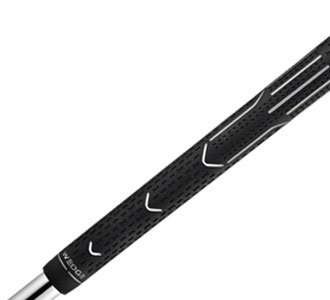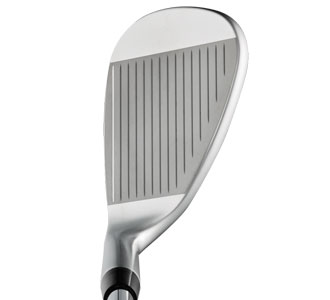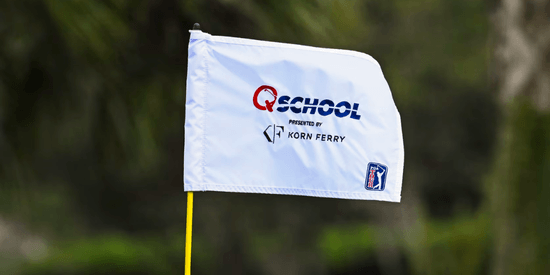Ping Glide Wedge Review
4/2/2015 | by Pete Wlodkowski of AmateurGolf.com
see also: Equipment Reviews

AmateurGolf.com looks at Ping's Glide wedges, with custom grips and three sole options - they are "engineered from grip to sole"
As it turns out, grips and shafts are fairly standard in most wedges, and once a company settles on a standard spec for those items they tend not to shake things up too much. With Glide, Ping has started by adding ¾” to the length of their proprietary “Dyla-wedge” grip to encourage gripping down, as you often see pros do on TV when trying to control the trajectory and distance of their wedge shots around the green and even from farther out in the fairway.
The black Dyla-wedge grip has white grip-down markings that helps a golfer remember the perfect hand placement, and less taper so that as you get close to the end there is more material to hold on to. It’s a concept we’ve seen Lamkin implement successfully in their Performance-Plus wedge grip and I’m sure it will be a winner for Ping.
 |
Ping's
proprietary grip is 3/4 of an inch longer to
encourage gripping down. |
Moving towards the head, players have a choice of the low-mid flight CFS wedge shaft (one flex, 112 grams) or the TFC 419I graphite shaft, which weigh between 70-86 grams depending on flex.
The profile at address is pretty traditional, with a slight offset. The Glide wedges are really easy to square up, and look good in the laid off or open position as well. Flipping the head around reveals a smooth undercut that may be more appealing to traditionalists than some of Ping’s other models.
Now to the bottom of the Glide, where the three models designate a standard (SS), narrow (NS) or wide sole (WS) for different player and shot types. Whichever sole grind you end up choosing will ultimately depend on your particular attack angle (steep vs. shallow) and the turf conditions you typically play from.
Most players will opt for the standard sole grind due to its versatility and ability to accommodate moderate attack angles. If you play on really firm conditions where hard-pan lies are commonly encountered, a thin sole wedge which comes in two models (58 and 60 degrees, both with maximum bounce) can make short work of shots where the margin of error is razor thin. If however your course offers lush conditions, you might want to experiment with a wide sole model available in four loft and bounce combinations (from 54 degrees to 60 degrees).
 |
The
Glide's 431 stainless steel face uses a
moisture-repelling chrome finish. |
Finally let’s talk about the face which is impressive in its own right. After conducting studies that measured the effectiveness of certain materials to repel water, Ping discovered that a chrome-plated finish allowed their Glide wedges to move water away from the face more effectively than any other finish. According to Ping, the new wedge is 220 percent more consistent in wet grass and 35 percent more consistent in dry turf than the Tour Gorge wedge line that preceded it.
To further improve turf interaction and enhance shot-making control, Ping engineers optimized the groove placement, varying the radius and sidewall angles. A 16-degree sidewall in lower lofts maximizes volume on full shots. Higher lofted wedges (56 to 60 degrees) have steeper sidewalls and a tighter radius to add more bite to open-faced shots played around the greens.
Given all the changes, some of which demonstrate real out-of the-box thinking, Ping has a made a wedge that effortlessly combines versatility, performance and ease- of-use that makes getting up and down a whole lot easier for all golfers.
Most Popular Articles

2025 PGA TOUR Q-School Guide: Sites, Scores, and Who Advanced
Dec 5, 2025Second Stage is complete and Final Stage awaits at Sawgrass — follow every Q-School leaderboard and the players still chasing
2025 LPGA TOUR Q-Series: Final Qualifying Stage FINAL SCORING
Dec 8, 2025Helen Briem earns medalist honors, 31 players headed to the LPGA next year
Australian Open at Royal Melbourne: Preview, amateur bios, and how to watch
Nov 30, 2025Rory McIlroy headlines one of the championship's top fields in years - at least four amateurs will have their chance at glory
Luke Ringkamp Cruises to Rolex Tournament of Champions Title at TPC San Antonio
Nov 26, 2025One week after committing to Pepperdine, Luke Ringkamp won the Rolex Tournament of Champions by nine shots.Inside Gil Hanse’s Restoration of Baltusrol’s Upper Course: A Return to Tillinghast’s
Dec 11, 2025Renowned architect Gil Hanse reveals how he brought Baltusrol’s Upper Course back to life by honoring A.W. Tillinghast’s originalLoading latest news...
